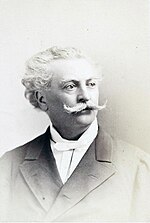Désiré Charnay
| Désiré Charnay | |
|---|---|

Désiré Charnay.
|
|
| Born | 2 May 1828 Fleurieux-sur-l'Arbresle |
| Died | October 24, 1915 (aged 87) |
| Nationality | French |
| Fields | archaeology |
Claude-Joseph Désiré Charnay (2 May 1828 – 24 October 1915) was a French traveller and archaeologist notable both for his explorations of Mexico and Central America, and for the pioneering use of photography to document his discoveries.
He was born in Fleurieux-sur-l'Arbresle, and studied at the Lycée Charlemagne. During 1850, he became a teacher in New Orleans, Louisiana, a partly French-speaking community, and there became acquainted with John Lloyd Stephens's books of travel in Yucatan. He travelled in Mexico, by commission from the French ministry of education, during 1857-1861; in Madagascar during 1863; back to Mexico during 1864, with the French troops of Emperor Maximilian, in South America, particularly Chile and Argentina, during 1875; and in Java and Australia during 1878. During 1880-1883, he again visited the ruined cities of Mexico. Pierre Lorillard IV of New York City contributed to defray the expense of this expedition, and Charnay named a great ruined city near the Guatemalan boundary line "Ville Lorillard" in his honor; the name did not become used commonly and the site is known more usually as Yaxchilan. Charnay went to Yucatan during 1886.
Charnay was aware of new legislation in Mexico that attempted to protect its archeological sites and treasures, and obtained a license from the government during July 1880. By its terms, he could explore widely and remove artifacts but they had to be sent to the National Museum first. The museum could keep the majority, but the rest could be sent to France. Despite the contract, members of the Mexican Congress objected, and there were impassioned speeches by Vicente Riva Palacio, liberal general who had fought the French, and liberal intellectual Guillermo Prieto. Justo Sierra, later a major official during the regime of Porfirio Díaz, was in favor of the contract. In the end the Charnay contract was rejected 114-6. He had, however, already violated the terms of the contract, hiding smaller artifacts from Mexican officials and only submitting to inspection those that were too big to hide.
...
Wikipedia
